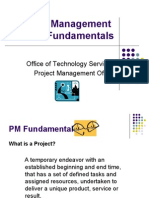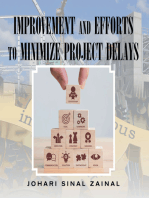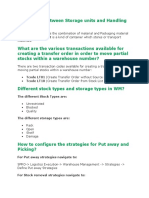Professional Documents
Culture Documents
PP-16-Project Board Terms of Reference
PP-16-Project Board Terms of Reference
Uploaded by
SALAH HELLARAOriginal Description:
Copyright
Available Formats
Share this document
Did you find this document useful?
Is this content inappropriate?
Report this DocumentCopyright:
Available Formats
PP-16-Project Board Terms of Reference
PP-16-Project Board Terms of Reference
Uploaded by
SALAH HELLARACopyright:
Available Formats
ECS Procedures
PP-15-PPTR
Project Board Terms of Reference
Estates & Campus Services Works Projects Project Boards
Standard Terms of Reference
Role
A Project Board will be set up to oversee all projects that have a Project Charter as implemented by
the Physical Estate Programme Implementation Board, or those projects that are in progress,
comprising projects that are likely to exceed £1.0m in construction value or where the project would
benefit from such governance. The project board shall exist until the final account for the project has
been agreed and the Project Implementation Review has been completed.
Each Project Board will have a Sponsor, as defined in the Project Charter. The Sponsor will act as the
main point of contact between the College or Directorate they represent and the Estates and
Campus Services Directorate. The Sponsor will play an integral and focal part of the project. The
Sponsor shall be aware that all projects require a certain time commitment on their behalf which at
times, depending upon the complexity of the project may be substantial.
To be effective, the Sponsor must have a commitment to the success of the project, together with a
clear understanding of the business drivers. They must have authority, responsibility and
understanding and will have the accountability and responsibility to lead the project to a successful
outcome ensuring the project objectives are met.
If a project covers more than one user group or College then Sponsors will be required from each
user group but with a Lead Sponsor agreed.
The Sponsor must be able to act with the full authority of the College or Directorate they represent.
They must be the point of contact for the design brief responsibilities in collaboration with the
Estates and Campus Services Programme/Project Manager.
The Sponsor will act as an arbiter on any disputes which occur between the delivery team, support
the Director of Estates and Campus Services and act on behalf of the University in any specific
challenging matters concerning Stakeholders external to the University. The Sponsor will also
approve or recommend for approval any changes to the scope of the project, ensuring that any
impact on time, cost, quality or other key objectives are assessed and reported to the Physical Estate
Programme Implementation Board and senior management as appropriate.
Where the project is LTM the sponsor will have reduced responsibilities as the business driver and
business case will be the responsibility of Estates and Campus Services Directorate. For LTM the
Project Owner will be the Director Estates and Campus Services.
The Project Board is responsible for:
1. Review the Project Status Report (e.g. Project Manager Dashboard) which will include a status
report covering:-
a. Clearly defined project brief and scope as defined in the Project Charter
b. Establishing an approved budget
c. Current forecast total expenditure, under or overspend forecast, contingency forecast
d. Summary and overall status RAG
e. Programme RAG
f. Cost RAG
g. Design & quality RAG
h. Risk RAG
i. Communications RAG
j. Escalating issues to the Physical Estate Programme Implementation Board
The RAG status will be determined by Green – project on course and no action envisaged;
Amber- minor problems some of which may need escalation; Red – major problems which
are raised in the report and require escalation to the Programme Board.
2. Monitor and review the risk register for the project.
Version 1.0 Page 1 of 3 October 2018
ECS Procedures
PP-15-PPTR
Project Board Terms of Reference
3. Ensure timely decisions are made and that the brief and design are signed off and frozen at the
defined work stages.
4. Review and manage all change control requests; the project board able to approve change that
remains in-line with the approved project budget allocation, however considers risk
apportionment.
5. Ensure work streams (e.g. IT, Communications, Finance, HR, and Operations etc.) are resourced
adequately and review work stream reports by exception.
6. Escalating issues to the Physical Estate Programme Implementation Board when required.
Note: Where change requests (individual or cumulative) exceed acceptable pre-construction levels
e.g. 10% contingency (design and construction), this would require escalation. Once in post-contract
(construction) stage, a risk/contingency drawdown schedule should be produced by the project
team for approval by the project board to encourage effective allocation/apportionment of risk
contingency as risk reduces throughout the project lifecycle.
The Project Board will be convened monthly and chaired by a member of the Estates Directorate.
The ‘Project Owner’ will attend as defined in the Project Charter. The Chair will be responsible for
ensuring the Board adheres to the Terms of Reference. The Chair will also be responsible for:-
1. Establishing the project Board and setting out the necessary communication processes.
2. Where appropriate, identify and obtain all necessary resources (financial and people) to ensure
that the Project Board completes its work effectively.
3. Ensure that a Project Charter and Project Manager Dashboard are in place before proceeding
with the Project.
4. Ensure that any changes in circumstances affecting the project are evaluated and that
appropriate action is taken.
5. Ensure that a post occupancy evaluation is carried out and considered by all users and key
stakeholders on the project.
6. Balance the needs of the University and the user’s requirements.
Secretariat
Normally to be provided by Estates and Campus Services.
Reports to
Physical Estate Programme Implementation Board
Constitution and Membership
Project Chair
Project Sponsor
Project Owner
Head of Programme
University Project Manager
External Consultants (as required)
Senior End-User representative
Student Representative(s)
Board Secretary
Work stream Leads as required include Estates, IT, Communications, Space and Operations,
Legal/Procurement etc.
Version 1.0 Page 2 of 3 October 2018
ECS Procedures
PP-15-PPTR
Project Board Terms of Reference
To enable the project board to fulfil its responsibilities, an update on project status will be issued 3
days in advance (minimum) of the meeting and presented by the University Project Manager. This
will be presented in the form of the Dashboard Report and contain the following;
• An illustration of project programme including assessment of performance against key
tasks/milestones/gateways,
• A short review of progress, by reference to key dates and project milestones.
• A review of principal actions undertaken during the period.
• Elemental summary of financial performance; Anticipated Final Cost of the project, compared
with the approved budget.
• ‘Headline’ review of contract administration.
• Project approval status.
• An explanation of departures from, and updated forecasts for, project performance, programme
and budget objectives.
• Resolution of key decisions required.
• Establish problems requiring resolution.
• A forecast of principal actions for the forthcoming period.
• A list of key issues including potential changes in scope of the Works.
• A list of outstanding information or decisions required to maintain project progress in accordance
with the programme.
• Change control status.
• Risk status, including factorised cost.
• Forthcoming key meetings.
Duration of Appointment
For the duration of the project.
Frequency of Meetings
To be agreed at the first meeting.
Quorum
All who are required to attend a project board meeting must make a concerted effort to ensure
continuity of personnel is maintained for the full duration of the project to encourage proper
discharge of their responsibilities. If deputies are to be nominated, they must be fully briefed prior to
attending and hold delegated powers to facilitate decision making.
Note: When required, a ‘Quorum’ project board may need to be convened to facilitate key decisions
preventing delay to programme. As a minimum, the following must be represented at such a
meeting;
Project Chair
Project Sponsor or Senior End-User Representative (Delegate)
Project Owner
Project Manager
Version 1.0 Page 3 of 3 October 2018
You might also like
- Q & As for the PMBOK® Guide Sixth EditionFrom EverandQ & As for the PMBOK® Guide Sixth EditionRating: 4.5 out of 5 stars4.5/5 (18)
- WNS00 PP PC 0001Document11 pagesWNS00 PP PC 0001Subramanian Saravanan100% (1)
- 3.05 Global IT Solution Delivery Policy - Rev 1.0Document8 pages3.05 Global IT Solution Delivery Policy - Rev 1.0dddibalNo ratings yet
- Assessors GuideDocument25 pagesAssessors Guidejoeven64100% (1)
- Integrated Project Planning and Construction Based on ResultsFrom EverandIntegrated Project Planning and Construction Based on ResultsNo ratings yet
- Branding AssignmentDocument7 pagesBranding Assignmentpritom sarkerNo ratings yet
- Overview - Scrutiny Panel.28-Mar-07.Project Management Policy and Procedure - Appendix 1 PDFDocument5 pagesOverview - Scrutiny Panel.28-Mar-07.Project Management Policy and Procedure - Appendix 1 PDFJihad DarwishNo ratings yet
- Project AuditDocument37 pagesProject Auditakanksha.guptaNo ratings yet
- Construction Project Brief Template4Document14 pagesConstruction Project Brief Template4Chan Siew Chong0% (2)
- Guideline 3 Implementation and Monitoring Plan Preparation and AssessmentDocument60 pagesGuideline 3 Implementation and Monitoring Plan Preparation and AssessmentEthiopian Citizen100% (1)
- PManageDocument47 pagesPManagejunkmailtarsierNo ratings yet
- The Simplified Project Management ProcessDocument4 pagesThe Simplified Project Management Processnuraina aqilahNo ratings yet
- Project Management FundamentalsDocument31 pagesProject Management FundamentalsSlobodan MoračaNo ratings yet
- Project Management Fundamentals CourseDocument31 pagesProject Management Fundamentals CourseSachin ParmarNo ratings yet
- Part Iii: Project Planning: Learning ObjectivesDocument15 pagesPart Iii: Project Planning: Learning ObjectivesMateta ElieNo ratings yet
- Project Management ProcessDocument18 pagesProject Management Processvineetkrs002No ratings yet
- Chowdary NotesDocument82 pagesChowdary Notestippuraj100% (1)
- PCR GuideDocument6 pagesPCR GuideDhruv UmadikarNo ratings yet
- CDC U P P G: Nified Rocess Ractices UideDocument4 pagesCDC U P P G: Nified Rocess Ractices UideSrinivasa RajuNo ratings yet
- Projects General Info: Guidance On The Preparation of A Client BriefDocument5 pagesProjects General Info: Guidance On The Preparation of A Client BriefBryan ScofieldNo ratings yet
- Project Management Process Review - Project Management Review - Report - FinalDocument34 pagesProject Management Process Review - Project Management Review - Report - FinalandreibenicioNo ratings yet
- Module 3 Project InitiationDocument43 pagesModule 3 Project Initiationforthis2No ratings yet
- Project Life Cycle: Project Planning, Management & Engineering EconomicsDocument33 pagesProject Life Cycle: Project Planning, Management & Engineering EconomicsShahid AliNo ratings yet
- Project Management Procedures4266Document27 pagesProject Management Procedures4266Hamayoun MurtazaNo ratings yet
- Australian Catholic University Project Management Policy: ScopeDocument2 pagesAustralian Catholic University Project Management Policy: ScopeAlexandra AlupeiNo ratings yet
- Project ControlDocument4 pagesProject ControlVishal TiwariNo ratings yet
- PMO Guidlelines 4.44Document13 pagesPMO Guidlelines 4.44Jack777100No ratings yet
- Project Control Process Unit 5Document6 pagesProject Control Process Unit 5gkvimal nathanNo ratings yet
- CRS Project-Management-PlanDocument12 pagesCRS Project-Management-PlanGervie Cabang PalattaoNo ratings yet
- Latest ReportDocument45 pagesLatest ReportFaizal AbdullahNo ratings yet
- Project Parivartan Implementation Structure, Nov 2011Document4 pagesProject Parivartan Implementation Structure, Nov 2011Suravaram KumarNo ratings yet
- Project Management Proj - LifecycleDocument5 pagesProject Management Proj - LifecycleSohini DasNo ratings yet
- Project Management LifecycleDocument39 pagesProject Management LifecycleNirav Desai100% (1)
- BSBPMG521 - Presentation - Week 2 - Eff - 181113Document23 pagesBSBPMG521 - Presentation - Week 2 - Eff - 181113Duvan BermudezNo ratings yet
- Terms of Reference For Project Manager: Job Title Project TitleDocument6 pagesTerms of Reference For Project Manager: Job Title Project Titlesofianina05No ratings yet
- Guideline 5 Mid-Term Review and Completion Review 5Document38 pagesGuideline 5 Mid-Term Review and Completion Review 5Ethiopian CitizenNo ratings yet
- Treasury Board of Canada Secretariat: Project Management AuditDocument18 pagesTreasury Board of Canada Secretariat: Project Management AuditAbdulGhaffarEshaqAlKhajahNo ratings yet
- Integration: Approved Change RequestsDocument25 pagesIntegration: Approved Change RequestsGyanendra Singh100% (1)
- National Institute of Construction Management & Research Pune School of Distance EducationDocument21 pagesNational Institute of Construction Management & Research Pune School of Distance EducationAnant BodhankarNo ratings yet
- Introduction To Project Management: Subject Code - PM0010Document10 pagesIntroduction To Project Management: Subject Code - PM0010Umesh BabuNo ratings yet
- OG - Audit Report - Part 2 - Group No. 9Document24 pagesOG - Audit Report - Part 2 - Group No. 9Karan BhavsarNo ratings yet
- The Five PMBOK Process GroupsDocument2 pagesThe Five PMBOK Process GroupssunilNo ratings yet
- Chapter Two Project ManagementDocument20 pagesChapter Two Project ManagementazolaabuleleNo ratings yet
- Project Plan: (Instructions)Document13 pagesProject Plan: (Instructions)Santosh NittalaNo ratings yet
- PMP Comprehensive Notes - ChowdaryDocument27 pagesPMP Comprehensive Notes - Chowdarysj1933050% (2)
- Inception Report C-SEA CollegeDocument9 pagesInception Report C-SEA CollegeMadalitso MukiwaNo ratings yet
- PMP Comprehensive Notes - ChowdaryDocument27 pagesPMP Comprehensive Notes - ChowdarySachith Seneviratna100% (3)
- PMP Comprehensive Notes - ChowdaryDocument27 pagesPMP Comprehensive Notes - ChowdaryOsama Lubbadeh100% (2)
- Chapter 4Document10 pagesChapter 4zedamtie2015No ratings yet
- Standard Planning ProcedureDocument16 pagesStandard Planning ProcedureNicholas PorterNo ratings yet
- 3.6 A. Schedule Control ProcedureDocument6 pages3.6 A. Schedule Control ProcedureChiamaka ObadiegwuNo ratings yet
- Template 1, Project Charter.: Albright College Management SystemDocument18 pagesTemplate 1, Project Charter.: Albright College Management SystemDuvan BermudezNo ratings yet
- PROMDocument7 pagesPROMZindy TorinoNo ratings yet
- Project Management: SyllabusDocument16 pagesProject Management: SyllabusNiket KawaleNo ratings yet
- Introduction On Project and Construction ManagementDocument10 pagesIntroduction On Project and Construction ManagementIna RoseNo ratings yet
- Introduction to Project Management: The Quick Reference HandbookFrom EverandIntroduction to Project Management: The Quick Reference HandbookNo ratings yet
- Handle Handover Project To End UserDocument41 pagesHandle Handover Project To End UserSALAH HELLARANo ratings yet
- Edu Technologique Activites 7bDocument176 pagesEdu Technologique Activites 7bSALAH HELLARANo ratings yet
- ربيع الأندلس 51813Document351 pagesربيع الأندلس 51813SALAH HELLARANo ratings yet
- كتاب الأستاذ في النحو العربي - السنة السابعة أساسيDocument212 pagesكتاب الأستاذ في النحو العربي - السنة السابعة أساسيSALAH HELLARANo ratings yet
- 12612Document4 pages12612SALAH HELLARANo ratings yet
- Al SehmiahDocument4 pagesAl SehmiahSALAH HELLARANo ratings yet
- Indicators For Measuring Performance of Building Construction Companies in Kingdom of Saudi ArabiaDocument10 pagesIndicators For Measuring Performance of Building Construction Companies in Kingdom of Saudi ArabiaSALAH HELLARANo ratings yet
- 20-07 Price ListDocument1 page20-07 Price ListSALAH HELLARANo ratings yet
- Pwa Roads & Drainage Cad Standards Manual Ver 5.0Document208 pagesPwa Roads & Drainage Cad Standards Manual Ver 5.0SALAH HELLARANo ratings yet
- Cahier de Production Écrite 4-5-6emeDocument34 pagesCahier de Production Écrite 4-5-6emeSALAH HELLARANo ratings yet
- Public-Private Partnerships: Certified Specialist ProgramDocument2 pagesPublic-Private Partnerships: Certified Specialist ProgramSALAH HELLARANo ratings yet
- Implementation of Pmo and Epm MicrosoftDocument72 pagesImplementation of Pmo and Epm MicrosoftSALAH HELLARANo ratings yet
- General English 3Document3 pagesGeneral English 3SALAH HELLARANo ratings yet
- Total Quality Management TQM ZERO EFFECT ZERO DEFECT ZED01Document11 pagesTotal Quality Management TQM ZERO EFFECT ZERO DEFECT ZED01SALAH HELLARANo ratings yet
- English Book 5th FORM TUNISIADocument33 pagesEnglish Book 5th FORM TUNISIASALAH HELLARA100% (1)
- Mapping Stakeholder Perceptions For A Third Sector OrganizationDocument24 pagesMapping Stakeholder Perceptions For A Third Sector OrganizationSALAH HELLARANo ratings yet
- Key Performance Indicators of Stakeholder Management in Construction Projects: International Experts PerspectiveDocument14 pagesKey Performance Indicators of Stakeholder Management in Construction Projects: International Experts PerspectiveSALAH HELLARANo ratings yet
- Cibuk 1 - Stakeholder Engagement Plan2Document13 pagesCibuk 1 - Stakeholder Engagement Plan2SALAH HELLARANo ratings yet
- Report Cover Page: ACERA ProjectDocument52 pagesReport Cover Page: ACERA ProjectSALAH HELLARANo ratings yet
- Purchase : Company Name ABCDocument16 pagesPurchase : Company Name ABCPratik DiyoraNo ratings yet
- 1758 POM Prelim Exam Part 3 PDFDocument6 pages1758 POM Prelim Exam Part 3 PDFREIGN EBONY ANNE AGUSTINNo ratings yet
- Business and Management - Course Companion - Lominé Muchena and Pierce - Oxford 2014Document95 pagesBusiness and Management - Course Companion - Lominé Muchena and Pierce - Oxford 2014Anthony Mafuta MayilameneNo ratings yet
- Asif Internship (Starting Page)Document4 pagesAsif Internship (Starting Page)Md Enayat RezaNo ratings yet
- Handling Unit (HU) Is The Combination of Material and Packaging MaterialDocument22 pagesHandling Unit (HU) Is The Combination of Material and Packaging MaterialDeepakNo ratings yet
- Case 3: Bob Mogielnicki: Direct Labor/hundred. Each Machine Operator Kept A Time SheetDocument4 pagesCase 3: Bob Mogielnicki: Direct Labor/hundred. Each Machine Operator Kept A Time SheetAngel GondaNo ratings yet
- Assignment - DMBA301 - MBA 3 - Set 1 and 2 - Aug Sept 2022Document2 pagesAssignment - DMBA301 - MBA 3 - Set 1 and 2 - Aug Sept 2022RajeshwariNo ratings yet
- MA2 Pocket Notes 2020 21Document169 pagesMA2 Pocket Notes 2020 21ReyilNo ratings yet
- Udemy Business Process v6 2023Document168 pagesUdemy Business Process v6 2023nf2gy65wjkNo ratings yet
- Bme 1 Operation Management in Tourism Hospitality Industry: Carmelita Paguyo - SerranoDocument25 pagesBme 1 Operation Management in Tourism Hospitality Industry: Carmelita Paguyo - SerranoAmabelle DuranNo ratings yet
- Receipt - CMC Rescue - Rescue Equipment - RescueDocument1 pageReceipt - CMC Rescue - Rescue Equipment - RescueEric RavestNo ratings yet
- Lec 3 - Ethics & The Audit ProfessionDocument3 pagesLec 3 - Ethics & The Audit ProfessionHà PhạmNo ratings yet
- Learnsignal September 2021 12-Week ACCA Study Plan: Select Your Subject Below and Start Studying!Document1 pageLearnsignal September 2021 12-Week ACCA Study Plan: Select Your Subject Below and Start Studying!FazNo ratings yet
- Programme Engineer - STA - IOM Libya in TunisDocument5 pagesProgramme Engineer - STA - IOM Libya in TunisDe Guzman MappingNo ratings yet
- Abdul Sattar Update RESUME PDF 1234 NEWDocument3 pagesAbdul Sattar Update RESUME PDF 1234 NEWyasiriftikharNo ratings yet
- Pitch Deck Honda AopDocument10 pagesPitch Deck Honda AopvikrantNo ratings yet
- School Lib TableDocument12 pagesSchool Lib TableCeasar Ryan AsuncionNo ratings yet
- REVIEWERStrategic ManagementDocument10 pagesREVIEWERStrategic ManagementDiane SarigumbaNo ratings yet
- Speaking MarksheetDocument2 pagesSpeaking MarksheetarmonbhuyanNo ratings yet
- Annual Report 2018 FinalDocument89 pagesAnnual Report 2018 FinalTonmoy ParthoNo ratings yet
- Checklist For Working at HeightsDocument3 pagesChecklist For Working at HeightsVaradaraju ThirunavukkarasanNo ratings yet
- Pom Chapter 5 ControllingDocument12 pagesPom Chapter 5 ControllingNUR ANIQAHNo ratings yet
- BSC, Diploma, Certificate BSC, Diploma, Certificate: 80 G.Sulindika CNR 6Th ST 80 G.Sulindika CNR 6Th STDocument3 pagesBSC, Diploma, Certificate BSC, Diploma, Certificate: 80 G.Sulindika CNR 6Th ST 80 G.Sulindika CNR 6Th STJosiah MwashitaNo ratings yet
- KELLOGG Case Study (Kotra Subhadra Rucha)Document3 pagesKELLOGG Case Study (Kotra Subhadra Rucha)RuchaNo ratings yet
- ENG302 Part 2Document7 pagesENG302 Part 2Oğuzhan DalkılıçNo ratings yet
- CV Sample 4Document3 pagesCV Sample 4letiendabaNo ratings yet
- Medryl Healthcare Services (OPC) Private Limited: Address: G-4, Gaur Heights, Sec-4, Vaishali Phone: 9910773346Document1 pageMedryl Healthcare Services (OPC) Private Limited: Address: G-4, Gaur Heights, Sec-4, Vaishali Phone: 9910773346sachinjangid8778No ratings yet
- The Innovation of DecathlonDocument18 pagesThe Innovation of DecathlonjudeuNo ratings yet
- Key Account Manager - VietnamDocument4 pagesKey Account Manager - VietnamEliza NguyenNo ratings yet












































































































